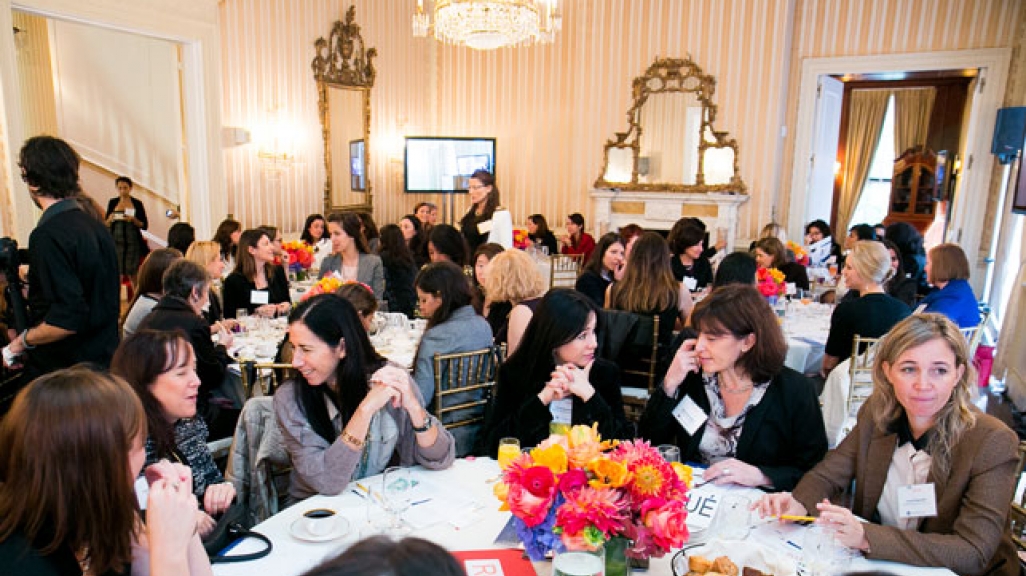Summary: Women's Hemispheric Network — Cultivating the Next Generation of Female Leaders
Summary: Women's Hemispheric Network — Cultivating the Next Generation of Female Leaders
With 180 women in attendance, speakers shared personal stories about advancing in their fields and the importance of mentoring.
On October 11, Americas Society/Council of the Americas’ Women's Hemispheric Network held its annual women’s networking event and workshop in New York. Read highlights of the event and see videos of the panels.
Browse by panel:
- Opening Remarks
- Women Leading STEM Fields
- The Value of Mentoring – A Leader’s View
- Sponsorship—Securing a Path to Leadership
- Susan Segal, President and CEO, Americas Society/Council of the Americas
- Margarita Zavala, Former First Lady of Mexico
Keynote Speaker
- Sallie Krawcheck, Business Leader, 85 Broads
In opening remarks, speakers highlighted the progress made by the network since its launch exactly a year ago—including holding events in Latin America and the creation of its new LinkedIn group to keep members connected. They also discussed the importance of the network in the region for the promotion of women in the workforce and leadership positions. “AS/COA has invited us to share our own stories. Sharing our experiences as women is critical to our advancement,” said former First Lady of Mexico Margarita Zavala, who helped establish the network in 2012.
In her keynote address, Sallie Krawcheck of 85 Broads, a global women's network, reflected on her career in the financial sector and what it had meant to be one of the few women at the top. She stressed the importance of bringing women into the economic and political process, citing a recent study from the Center for Talent Innovation that shows diverse teams drive more innovation. Krawcheck pointed out that research continues to show that more women in companies and senior leadership positions leads to lower risk, lower volatility, greater client focus, and better stockholder returns. She encouraged attendees to build up a strong network in and out of their companies and to find sponsors in the workplace. She also urged proactive behavior for women in their careers, including asking for raises and soliciting feedback. “Meditating in your room and making lists of pros and cons for your future can be very helpful—but it isn’t the same as going out and getting your hands dirty,” Krawcheck advised.
Sponsorship—Securing a Path to Leadership
Speakers:
- John McCorry, Executive Editor for the Americas, Bloomberg News
- Adriana Arai, Managing Editor, Latin America, Bloomberg News
- Nayeli Chavez-Geller, Correspondent, Primer Impacto, Univision (moderator)
During the final panel of the day, Univision's Nayeli Chavez-Geller moderated a conversation between Bloomberg's John McCorry of Bloomberg and a woman he sponsored, Adriana Arai. Both McCorry and Arai agreed that sponsorship is a partnership in which both parties make an investment and there is opportunity for mutual benefit. Arai recalled McCorry saying from the very beginning, “Your success is my success; your failure is my failure.” McCorry recognized Arai’s potential when she was Bloomberg's bureau chief of Mexico City.
McCorry spoke about his own sponsorship relationships and how those men had taken a risk to give him opportunities. Those relationships paved the way for his relationship with those he sponsored, like Arai. He said that sponsorship is not only good for both sides, but also for the company.
Arai commented on how important McCorry had been for her career advancement. He helped her build a meaningful network of key contacts, gave her credit on projects, and told people he wanted them to hear her thoughts, views, and ideas. She noted, however, that the relationship should not be one-sided. The search for a sponsor, she said, should be focused on the key people in the employee’s section, and on what value the employee can add for her sponsor. McCorry agreed, remarking that Arai, who is more open to risks, complements him well and “makes him look good” by pushing the envelope. McCorry explained that in building one’s sponsorship network, women should choose people with whom they’d like to have a closer relationship.








